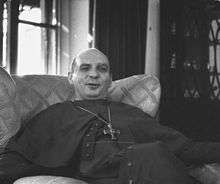Joost de Blank
| Joost de Blank | |
|---|---|
| Archbishop of Cape Town | |
 | |
| Church | Anglican |
| Province | Southern Africa |
| Metropolis | Cape Town |
| In office | 1957–1963 |
| Predecessor | Geoffrey Clayton |
| Successor | Robert Selby Taylor |
| Other posts | Bishop of Stepney (1952–1957) |
| Orders | |
| Ordination | 1932 |
| Consecration | 1952 |
| Personal details | |
| Born |
14 November 1908 Rotterdam, South Holland, Netherlands |
| Died |
1 January 1968 (aged 59) City of Westminster, Greater London, United Kingdom |
| Buried | Westminster Abbey |
| Nationality | Dutch/British |
| Education | Merchant Taylors' School |
| Alma mater |
Queens' College, Cambridge King's College London Ridley Hall, Cambridge |
Joost de Blank (14 November 1908 – 1 January 1968)[1] was the Archbishop of Cape Town, South Africa from 1957[2] to 1963 and was known as the "scourge of apartheid" for his ardent opposition to the whites-only policies of the South African government.[3]
Education
De Blank was born in Rotterdam on 14 November 1908, he became a British subject as a child in 1921.[4] He was educated at Merchant Taylors' School, King's College London, and Queens' College, Cambridge.
Clerical career
He was ordained after a period of study at Ridley Hall, Cambridge in 1932[5] and began his career as a Curate in Bath. De Blank held incumbencies at Forest Gate and Greenhill, Harrow. During World War II he was an army chaplain.[6]
In 1952 he was appointed the Bishop of Stepney in the Diocese of London[7] and continued in this post until he was translated to Cape Town.
During this bishopric, de Blank, visited Ruth Ellis in prison just before she was hanged, for the murder of David Blakeley in 1955, when she told him, "It is quite clear to me that I was not the person who shot him. When I saw myself with the revolver I knew I was another person." These comments were quoted in a London evening paper of the time, The Star.
South Africa
He succeeded Geoffrey Clayton as Archbishop of Cape Town in 1957. In South Africa, he refused to preach in any church not open to blacks as well as whites. He opposed clause 29 of Natives Law Amendment Bill, which gave the civil authorities powers to exclude non whites from Anglican churches. In 1960 De Blank called on the Dutch Reformed Church in South Africa (NGK) to repudiate apartheid, and in the same year criticised the South African jubilee celebrations: "This is no time for rejoicing, but for shame".
De Blank suffered a stroke which caused him to resign from Cape Town in 1963. He returned to England whereupon he was appointed a residentiary canon of Westminster Abbey.[8]
Honours and awards
- Appointed a sub-prelate of the Venerable Order of Saint John in 1952.[9]
- Appointed canon of Westminster Abbey in 1964.
De Blank died at Westminster on 1 January 1968 and was buried in Westminster Abbey.[10]
Styles
- The Reverend Joost de Blank (1932–1952)
- The Right Reverend Joost de Blank (1952–1957 & 1963–1968)
- The Most Reverend Joost de Blank (1957–1963)
Publications
- Inter-race relationships. Council of Christians and Jews. 1964.
- Uncomfortable words. Longmans, Green. 1958.
- Out of Africa. (Lectures, Sermons and Addresses Delivered by Bishop Joost de Blank when Archbishop of Cape Town.). London. 1964.
Notes and references
- ↑ Obituary Joost De Blank. The Times (London, England), Tuesday, Jan 02, 1968; pg. 8; Issue 57138
- ↑ New Archbishop's "Difficult Job". The Times (London, England), Saturday, May 11, 1957; pg. 4; Issue 53838
- ↑ "Apartheid Crazy", Archbishop Says. The Times (London, England), Saturday, Sep 26, 1959; pg. 5; Issue 54576.
- ↑ The London Gazette: no. 32344. p. 4452. 3 June 1921.
- ↑ Oxford University Press (1976). Crockford's Clerical Directory: A Reference Book of the Clergy of the Provinces of Canterbury and York and of Other Anglican Provinces and Dioceses. Oxford University Press. ISBN 978-0-19-200008-8.
- ↑ The London Gazette: (Supplement) no. 34886. p. 4008. 28 June 1940.
- ↑ The London Gazette: no. 39597. p. 3816. 15 July 1952.
- ↑ The London Gazette: no. 43228. p. 744. 24 January 1964.
- ↑ The London Gazette: no. 40073. p. 305. 12 January 1954.
- ↑ Richard Jenkyns (2011). Westminster Abbey. Harvard University Press. pp. 74–. ISBN 978-0-674-06197-2.
- Peart-Binns, John Stuart (1987). Archbishop Joost de Blank: Scourge of Apartheid. Muller, Blond & White. ISBN 978-0-584-11130-9.
- De Blank, Bartha (1977). Joost de Blank: A Personal Memoir. Boydell Press. ISBN 978-0-85115-082-6.
- Allen, John (2006). Rabble-Rouser for Peace: The Authorized Biography of Desmond Tutu. Simon and Schuster. ISBN 978-0-7432-9866-7.
- De Gruchy, John W. (2005). The Church Struggle in South Africa. Fortress Press. ISBN 978-0-8006-3755-2.
- Paine, Victor C. (1978). The Confrontation Between the Archbishop of Cape Town, Joost de Blank, and the South African Government on Racial Policies, (1957-1963). University of Cape Town.
- Anon (18 January 1964). "Joost de Blank: a farewell interview". The New African. 3 (1): 22–23. Retrieved 2014-09-16.
External links
| Church of England titles | ||
|---|---|---|
| Preceded by Robert Moberly |
Bishop of Stepney 1952–1957 |
Succeeded by Evered Lunt |
| Anglican Church of Southern Africa titles | ||
| Preceded by Geoffrey Clayton |
Archbishop of Cape Town 1957–1963 |
Succeeded by Robert Selby Taylor |